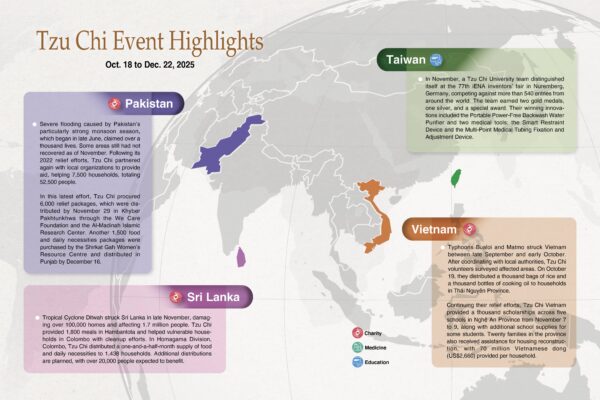Narrated by Liu Bao-yuan
Compiled by Zhang Mei-ling
Translated by Wu Hsiao-ting
Photo by Hsiao Yiu-hwa
I’m grateful for my husband’s unwavering support of my volunteer work with Tzu Chi. I’m also deeply moved by his considerate arrangement of his affairs and his fearless attitude toward death.

Every time I go to a hospital, my mind is transported back to four years ago, when my husband, Wang Zhen-ming (王振銘), and I were in and out of Dalin Tzu Chi Hospital, in Chiayi, southern Taiwan, for his treatment.
My husband was a police officer. After retiring in 2004, he joined me in volunteering for Tzu Chi. He did recycling work and served as a hospital volunteer at Dalin Tzu Chi Hospital. He also contributed his time at various Tzu Chi camps. He really enjoyed volunteering with the foundation. When asked why he hadn’t undertaken formal training to receive his volunteer certification, he answered, “I dedicated 39 years to my service as a police officer, never doing anything to compromise the reputation of the police force. However, when it came to becoming a certified Tzu Chi volunteer, I realized that adherence to the Ten Precepts was required. Because I couldn’t fully comply with all of them, I hesitated to join, fearing that I might unintentionally tarnish Tzu Chi’s honorable name. Hence, I am content with being someone who supports Tzu Chi.”
One day four years ago, he told me that he wanted to go see a gastroenterology specialist at Dalin Tzu Chi Hospital. “While lying on the couch watching TV this afternoon,” he explained, “I felt a lump in my stomach, and it seemed to be moving.” I was deeply concerned at what he had said, so I decided immediately to accompany him to the hospital to seek medical advice. Dr. Tseng Kuo-chi (曾國枝) performed a gastroscopy, followed by an MRI scan, which confirmed the presence of liver cancer. The tumor had grown quite large, so much so that only one-fifth of his liver remained healthy. Surgery and radiation therapy were not viable treatment options, leaving targeted therapy as the only feasible choice.
After leaving the consultation room, my husband comforted me, urging me not to be saddened by the news. “I’ve already lived to the age of 77, and that’s enough!” he said. “Don’t worry about me, just accept the treatment!” On our way to Dalin Station, he instructed me, “Don’t tell anyone about my condition. When the time comes, you and our children can take care of everything.” I expressed my concern in response: “Is that okay? Won’t those who are unaware blame me?” He reassured me to have peace of mind.
After returning home, he remained calm. A few days later, he invited a fellow Tzu Chi volunteer, Zhou Yi-ming (周義明), to our home. They shared a close bond and often carried out volunteer duties together. My husband sought Brother Zhou’s assistance in handling matters after his passing. He emphasized that a funeral and placing a memorial tablet in a columbarium were unnecessary. Instead, he expressed his desire for a tree burial. He had originally signed up to donate his body, but was unable to fulfill that wish due to having hepatitis C. I listened to their conversation nearby. When they conversed, it was as if they were discussing someone else’s affairs.
Our daughter lived in the United States. When she heard about her father’s illness, she was deeply saddened and returned to Taiwan to be by his side. When she learned that he had instructed me not to let anyone know about his condition, she pleaded, “Dad, we can’t do that. We have to tell Auntie and Uncle! Otherwise, they might be upset with us for keeping this from them.”
He took her words to heart. During the Tomb-Sweeping Festival, we returned to his hometown together. Everyone was astonished to see how much he had slimmed down from his original weight of 93 kilograms (205 pounds). They asked in surprise, “What happened?” He gently replied, “I have liver cancer. The doctor has given me a prognosis of six months, and I’ve already passed the halfway mark. I came back today to tell you all that when I pass, none of you should come to my home. You’re all getting on in years; don’t make the trip to Tainan. It would be too exhausting. My family won’t inform you, and my wife and children will take care of everything. I came back today to bid farewell to everyone.”
After we returned home, our daughter urged him, “Dad, you should let your good friends know, too! You can’t just leave quietly like this.” Listening to her again, he asked me to take him on a motor scooter to a friend’s house, where he shared his condition over a cup of tea. We visited other friends in the days that followed. One by one, he said goodbye to them.
When he moved into the palliative care ward at Dalin Tzu Chi Hospital, our fellow volunteers visited him continuously, offering support and encouragement. He was profoundly touched and grateful for their care. He said, “This is what Tzu Chi volunteers are like.” Several of the volunteers we were particularly close to continued to visit me even after he passed away. They were afraid that I would feel lonely on my own. Whenever there was a gathering, they invited me to join, too.
I joined Tzu Chi over 30 years ago. My husband always showed strong support for my volunteer work when he was still with us. He wholeheartedly embraced Dharma Master Cheng Yen’s teachings and internalized them more deeply than I have. He arranged his own affairs in such a simple and organized manner, ensuring that he didn’t burden others and that our family wouldn’t be overwhelmed by his matters. Witnessing his peaceful passing deeply moved me.
A nun at the Jing Si Abode, the Buddhist convent founded by Master Cheng Yen, said that we should wish him the best and allow him to go in peace. She expressed gratitude for his contributions as a volunteer, recognizing him as a Tzu Chi bodhisattva.



